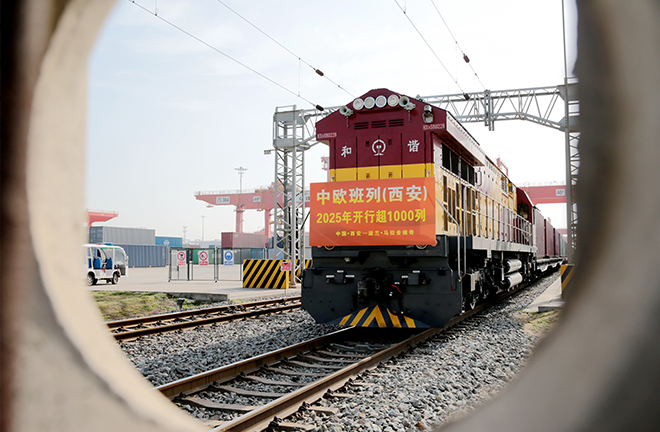Int’l scholars stress BRI’s benefits to China-Europe ties

A freight train of the China-Europe Railway Express, a flagship project of the Belt and Road Initiative, departs from Xi’an in northwest China to Małaszewicze in eastern Poland, on March 21. Photo: IC PHOTO
Scholars from Sweden, Germany, Norway, the Netherlands, Serbia, Slovenia, and other European countries recently convened for a webinar titled “EU-China Relations in a Rapidly Changing World,” organized by the Belt and Road Institute in Sweden (BRIX). Discussions focused on how China and Europe can reinforce their strategic partnership through mutual respect and win-win cooperation, even amid the complexities of globalization.
Underlying philosophical ideals of BRI
As the world undergoes profound transformations, Europe stands at a historic crossroads. Against this backdrop, Stephen Brawer, chairman of BRIX, emphasized the need for Europe to embrace a new direction—one aligned with China’s Belt and Road Initiative (BRI). He traced the BRI’s roots to over 5,000 years of Chinese civilization, shaped by the wisdom of great thinkers such as Confucius and Mencius, as well as the I Ching.
“The fact is, for many centuries, China has been one of the most advanced civilizations on the planet, but the goal of Chinese civilization has never been to dominate others,” Brawer said. “Instead, it embraces the belief of its great sages that the fundamental nature of human beings is essentially good.”
Brawer views the BRI as a global development policy that goes beyond physical infrastructure and economic benefits, focusing instead on broader, long-term progress. For this reason, he urged Europe to engage with the initiative, stating, “Choosing cooperation now may be a road less traveled, but in these dramatically changing times, it will ultimately make all the difference.”
Hussein Askary, vice chairman of BRIX, echoed this view, stressing that China’s global initiatives reflect deeply ingrained philosophical ideals. “This is a Chinese philosophy: If you want to prosper, help your neighbors prosper,” Askary remarked.
He highlighted China’s longstanding aid efforts in Africa, particularly those with a focus on the continent’s sustainable development. In projects such as the Grand Inga Dam in the Democratic Republic of the Congo and the Transaqua Lake Chad replenishment project, Askary sees significant potential for China-Europe collaboration. He emphasized that Africa’s population is growing rapidly, with a predominantly young demographic, while its abundant natural resources remain largely untapped and inadequate infrastructure severely hampers economic growth. If China and Europe collaborate on advancing Africa’s modernization, it could unlock tremendous potential for all parties involved.
Cooperation and joint development
The essence of China-Europe relations is rooted in mutual benefit and win-win cooperation. The BRI, as a key framework for collaboration proposed by China, has not only created many economic opportunities but has also played a pivotal role in advancing bilateral ties.
Bojan Lalic, a professor and director of the Belt and Road Institute in Belgrade, cited Serbia as a strong model for successful engagement with China. Since 2015, the China-Serbia relationship has grown increasingly closer, with remarkable achievements under the BRI framework, as China has extended substantial loans to Serbia for local infrastructure and industrial development.
“Most of the Chinese automotive producers are now in Serbia, providing job opportunities for the local community, and they are doubling their capacities every year because they see the country’s strategic location for exchange and cooperation,” said Lalic. He also underscored the construction of the Hungary-Serbia railway as an example of successful BRI collaboration. This flagship project, which connects Budapest and Belgrade, is progressing steadily. Once completed, it will reduce travel time between the two cities from eight hours to approximately three hours.
As the 50th anniversary of China-EU diplomatic relations approaches, new opportunities for cooperation are emerging. Li Xing, a professor and director of the European Research Center at the Guangdong Institute for International Strategies and adjunct professor of International Relations at Aalborg University in Denmark, held that Europe is currently facing two key challenges: economic recovery and strategic autonomy, both of which are intricately linked to China.
Since its introduction in 2013, the BRI has brought significant benefits to Europe. Li pointed out that in addition to Serbia receiving substantial infrastructure investments from China, Hungary has attracted large amounts of investment in battery manufacturing. Piraeus Port in Athens, Greece, once a declining port, has been transformed into one of Europe’s busiest ports under the effective management of China Ocean Shipping Company. According to the 2024 Xinhua-Baltic International Shipping Center Development Index, Piraeus ranked seventh among 43 global shipping centers, following Singapore, London, Shanghai, Hong Kong, Dubai, and Rotterdam.
Li also highlighted railways as another vital example of successful BRI collaboration. Despite international turbulence, China-Europe rail freight continues to thrive. He noted that as these trains pass through Chengdu [in southwest China’s Sichuan Province], stores specializing in European products have become more numerous, reflecting the increasing volume of imports from Europe via rail. This not only boosts China’s access to European products but also generates substantial revenue for Europe, showcasing the effectiveness of the BRI’s international cooperation framework.
Edited by CHEN MIRONG
